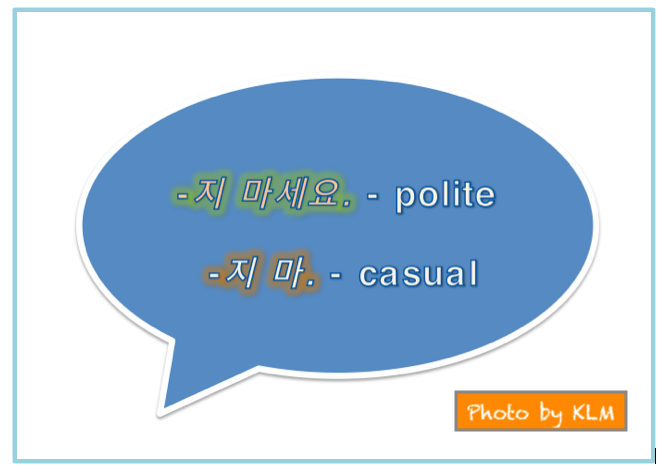2 Ways to Say, “Don’t…” in Korean Posted by Kyung-Hwa on Aug 29, 2018 in Grammar, Korean Language, Vocabulary
I often talk to a group of friends who lived in foreign countries and enjoy listening to their experiences of living abroad. Over the years, I learned that one of the survival phrases they learned quickly was “Don’t…” in different languages. I believe learning how to say, “Don’t…” in Korean will become useful when you travel to Korea or simply try to understand K-dramas. In this post, I will explain how to say, “Don’t…” in two different ways in Korean.
There are several ways to compose negative sentences in the Korean language. As I explained in an ealier post, “Like or Don’t Like in Korean”, especially in colloquial Korean, you can simply turn a positive statement into a negative one by adding “안 ” to a verb or to an adjective.
- 좋아해요 [jo-ah-hae-yo] : a polite form of the verb ‘like’ in Korean
ex) 저는 커피를 좋아해요. : I like coffee. – Polite
[jeo-neun keo-pee-reul jo-ah-hae-yo]
- 안 + 좋아해요 [ahn jo-ah hae-yo] : don’t like
ex) 저는 커피를 안 좋아해요. : I don’t like coffee. – Polite
[jeo-neun keo-pee-reul ahn jo-ah-hae-yo]
- 비싸요 [bee-ssa-yo] : a polite form of the adjective ‘ expensive’
ex) 신발이 비싸요. : Shoes are expensive. – Polite
[shin-bal-ee bee-ssa-yo]
- 안 + 비싸요 : not expensive – Polite
ex) 신발이 안 비싸요. : Shoes are not expensive.– Polite
[shin-bal-ee ahn bee-ssa-yo]
The following explanations refer to how to say negative imperative forms, “Don’t + Verb” in Korean: Knowing how to say “–지 마세요” and “–지마,” will be useful when you need to request or command someone not to do something in Korean.
- “-지 마세요” [-ji ma-seo-yo] is the polite form of “Don’t + Verb” in Korean
- “-지 마” [-ji ma] is the casual from of “Don’t + Verb” in Korean. Simply drop the ending, “세요” from the polite form, “–지마세요.”
Here are some essential phrases, using Don’t +Verb” in Korean.
- 하지 마세요. [ha-ji ma-se-yo] : Don’t do (it/this/that.), please. – polite
- 하지 마 . [ha-ji ma] : Don’t do (it/this/that.) – casual
- 걱정하지 마세요. [geok-jeong-ha-ji ma-se-yo] : Don’t worry, please – polite
- 걱정하지 마 [geok-jeong-ha-ji ma] = 걱정마 [geok-jeong ma] : Don’t worry. – casual
- 기다리지 마세요. [gi-da-ri-ji ma-se-yo] : Don’t wait, please. – polite
- 기다리지 마. [gi-da-ri-ji ma] : Don’t wait. – casual
- 울지 마세요. [wool-ji ma-se-yo] : Don’t cry, please. – polite
- 울지 마. [wool-ji ma ] : Don’t cry. – casual
- 말하지 마세요. [mal-ha-ji ma-se-yo] : Don’t speak, please. – polite
- 말하지 마. [mal-ha-ji ma] : Don’t speak. – casual
- 가지 마세요. [ga-ji ma-se-yo] : Don’t go, please. – polite
- 가지 마. [ga-ji ma] : Don’t go – casual
- 웃지 마세요. [woot-ji ma-se-yo] : Don’t laugh, please. – polite
- 웃지 마. [woot-ji ma] : Don’t laugh. – casual
- 전화하지 마세요. [jeon-hwa ha-ji ma-se-yo] : Don’t call, please. – polite
- 전화하지 마. [jeon-hwa ha-ji ma] : Don’t call. – casual
Here is one more sentence of “–지 마세요” in Korean: “Don’t forget to study Korean, please.”
“한국어 공부하는 거 잊지 마세요!” [han-gook-eo gong-boo-ha-neun guh it-ji ma-se-yo]
감사합니다! (Thank you!)

Build vocabulary, practice pronunciation, and more with Transparent Language Online. Available anytime, anywhere, on any device.




